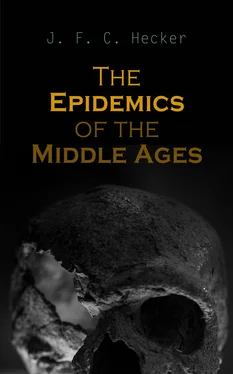Medicine extends not so far. The remains of animals make us indeed acquainted, even now, with diseases to which the brute creation was subject long ere the waters overflowed, and the mountains sunk; but the investigation which is our more immediate object, scarcely reaches to the beginning of human culture. Records of remote and of proximate eras, lie before us in rich abundance. They speak of the deviations and destructions of human life, of exterminated and newly-formed nations; they lay before us stupendous facts, which we are called upon to recognise and expound in order to solve this exalted problem. If physicians cannot boast of having unrolled these records with the avidity of true explorers of Nature, they may find some excuse in the nature of the inquiry—for the characters are dead, and the spirits of which they are the magic symbols, manifest themselves only to him who knows how to adjure them. Epidemics leave no corporeal traces; whence their history is perhaps more intellectual than the science of the Geologist, who, on his side, possesses the advantage of treating on subjects which strike the senses, and are therefore more attractive,—such as the impressions of plants no longer extant, and the skeletons of lost races of animals. This, however, does not entirely exculpate us from the charge of neglecting our science, in a quarter where the most important facts are to be unveiled. It is high time to make up for what has been left unaccomplished, if we would not remain idle and mean-spirited in the rear of other naturalists.
I was animated by these and similar reflections, and excited too by passing events, when I undertook to write the history of the “Black Death.” With some anxiety, I sent this book into the world, for it was scarcely to be expected that it would be everywhere received with indulgence, since it belonged to an hitherto unknown department of historical research, the utility of which might not be obvious in our practical times. Yet I soon received encouragement, not only from learned friends, but also from other men of distinguished merit, on whose judgment I placed great reliance; and thus I was led to hope that it was not in vain, and without some advantage to science, that I had unveiled the dismal picture of a long departed age.
This work I have followed up by a treatise on a nervous disorder, which, for the first time, appeared in the same century, as an epidemic, with symptoms that can be accounted for only by the spirit of the Middle Ages—symptoms which, in the manner of the diffusion of the disease among thousands of people, and of its propagation for more than two centuries, exercised a demoniacal influence over the human race, yet in close, though uncongenial alliance, with kindlier feelings. I have prepared materials for various other subjects, so far as the resources at my disposal extend, and I may hope, if circumstances prove favourable, to complete by degrees, the history of a more extensive series of Epidemics on the same plan as the “Black Death,” and the “Dancing Mania.”
Amid the accumulated materials which past ages afford, the powers and the life of one individual, even with the aid of previous study, are insufficient to complete a comprehensive history of Epidemics. The zealous activity of many must be exerted if we would speedily possess a work which is so much wanted in order that we may not encounter new epidemics with culpable ignorance of analogous phenomena. How often has it appeared on the breaking out of epidemics, as if the experience of so many centuries had been accumulated in vain. Men gazed at the phenomena with astonishment, and even before they had a just perception of their nature, pronounced their opinions, which, as they were divided into strongly opposed parties, they defended with all the ardour of zealots, wholly unconscious of the majesty of all-governing nature. In the descriptive branches of natural history, a person would infallibly expose himself to the severest censure, who should attempt to describe some hitherto unknown natural production, whether animal or vegetable, if he were ignorant of the allied genera and species, and perhaps neither a botanist nor zoologist; yet an analogous ignorance of epidemics, in those who nevertheless discussed their nature, but too frequently occurred, and men were insensible to the justest reproof. Thus it has ever been, and for this reason we cannot apply to ourselves in this department, the significant words of Bacon, that we are the ancients, and our forefathers the moderns, for we are equally remote, with them, from a scientific and comprehensive knowledge of epidemics. This might, and ought to be otherwise, in an age which, in other respects, may, with justice, boast of a rich diversity of knowledge, and of a rapid progress in the natural sciences.
If in the form of an address to the physicians of Germany, I express the wish to see such a melancholy state of things remedied, the nature of the subject requires that, with the exception of the still prevailing Cholera, remarkable universal epidemics should be selected for investigation. They form the grand epochs, according to which those epidemics which are less extensive, but not, on that account, less worthy of observation, naturally range themselves. Far be it from me to recommend any fixed series, or even the plan and method to be pursued in treating the subject. It would, perhaps, be, on the whole, most advantageous, if my honoured Colleagues, who attend to this request, were to commence with those epidemics for which they possess complete materials, and that entirely according to their own plan, without adopting any model for imitation, for in this manner simple historical truth will be best elicited. Should it, however, be found impracticable to furnish historical descriptions of entire epidemics, a task often attended with difficulties, interesting fragments of all kinds, for which there are rich treasures in MSS. and scarce works in various places, would be no less welcome and useful towards the great object of preparing a collective history of epidemics.
Up to the present moment, it might almost seem that the most essential preliminaries are wanting for the accomplishment of such an undertaking. The study of medical history is everywhere at a low ebb;—in France and England scarcely a trace remains, to the most serious detriment of the whole domain of medicine; in Germany too, there are but few who suspect what inexhaustible stores of instructive truth are lying dormant within their power; they may, perhaps, class them among theoretical doctrines, and commend the laborious investigation of them without being willing to recognise their spirit. None of the Universities of Germany, whose business it ought to be to provide, in this respect, for the prosperity of the inheritance committed to their charge, can boast a Professor’s chair for the History of Medicine; nay, in many, it is so entirely unknown, that it is not even regarded as an object of secondary importance, so that it is to be apprehended that the fame of German erudition, may, at least in medicine, gradually vanish, and our medical knowledge become, as practical indeed, but at the same time as assuming, as mechanical, and as defective, as that of France and England. Even those noble institutions, the Academies, in which the spirit of the eighteenth century still lingers, and whose more peculiar province it is to explore the rich pages of science, have not entered upon the history of Epidemics, and by their silence have encouraged the unfounded and injurious supposition, that this field is desolate and unfruitful.
All these obstacles are indeed great, but to determined and persevering exertion they are not insuperable; and, though we cannot conceal them from ourselves, we should not allow them to daunt our spirit. There is, in Germany, a sufficiency of intellectual power to overcome them; let this power be combined, and exert itself in active co-operation. Sooner or later a new road must be opened for Medical Science. Should the time not yet have arrived, I have at least endeavoured to discharge my duty, by attempting to point out its future direction.
Читать дальше










